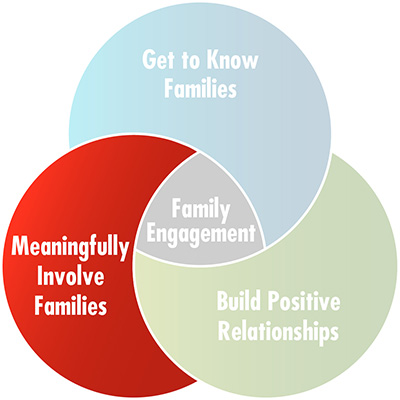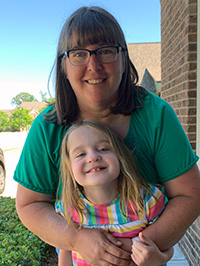How can educators engage these families?
Page 6: Meaningfully Involve Families
 To encourage family engagement, educators should involve families in a manner that is meaningful to them. The way in which a family gets involved in the education system is likely to be as unique as the family itself. A single mother working two jobs and struggling to make ends meet might find it difficult to allow her children to participate in after-school activities. On the other hand, she might make sure that her children read every day and complete their homework. Likewise, families who have children with disabilities will demonstrate their involvement in a wide variety of ways. Educators must be willing to work with all families and value the many ways that they choose to be involved. Below are six common categories of parental involvement.
To encourage family engagement, educators should involve families in a manner that is meaningful to them. The way in which a family gets involved in the education system is likely to be as unique as the family itself. A single mother working two jobs and struggling to make ends meet might find it difficult to allow her children to participate in after-school activities. On the other hand, she might make sure that her children read every day and complete their homework. Likewise, families who have children with disabilities will demonstrate their involvement in a wide variety of ways. Educators must be willing to work with all families and value the many ways that they choose to be involved. Below are six common categories of parental involvement.
| Category | Description and Examples |
|---|---|
| Parenting |
|
| Communicating |
When communicating with families, consider the following tips. Written communication:
Verbal communication:
Note: In some instances, the only communication parents receive from their child’s teacher is to address concerns about the child’s behavioral or academic deficits. Educators should make an effort to initiate positive and relevant communication with parents to establish a strong foundation of trust and cooperation. |
| Volunteering |
|
| Learning |
|
| School Decision Making |
|
| Collaborating with the Community |
|
(Adapted from School, Family, and Community Partnerships: Your Handbook for Action by J. Epstein, 2018 and 2002.)
Listen as Aubri Girardeau describes how she is involved in her child’s education and what her school could do to increase involvement among families of children with disabilities (time: 1:31).

Aubri Girardeau
Mother of a child with autism
and specific learning disabilities
Transcript: Aubri Girardeau
My daughter was in an inclusion classroom the last two years, so she was able to spend a majority of her day in a general education setting. And both of those years, I was able to volunteer for one of the roles that they had for parents so that I could be a little bit more involved. And anytime there were parties or opportunities for parents to come help shop in the book fair with their kids, I could be there for that. So a couple of different ways for me to be involved. I’m fortunate in that I can be at her school as often as the opportunity arises. The struggle is that she is not as independent if I’m there. So I have to balance my desire to be present in her school with is that really what’s best for her and her ability to go about her day.
I think if they encouraged parents of special needs kids to get involved in the PTA or PTO and tell them your voice could be heard, you can make changes that would benefit your child in addition to the rest of the kids, that would also probably be helpful. Just find a way for families to mix and mingle with parents of non-disabled children in the school setting. Just so everybody can see each other and be more aware of each other. One other thing, they probably would have to get permission from parents, but maybe feature the special needs students on social media like they do all the other kids. So if they’ll say Miss so-and-so’s class had a great time making artwork today. Do that also with these classes. Just some parents are oblivious really to, oh, there’s a special needs setting in the school, I didn’t know that. And it’s no fault of theirs. They just weren’t aware. Maybe just have more of a presence in the school community.